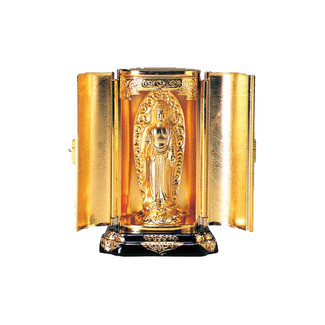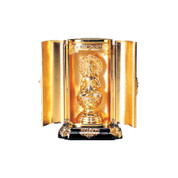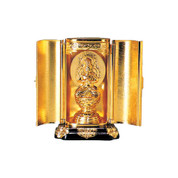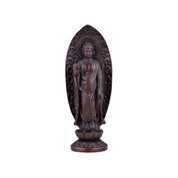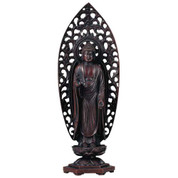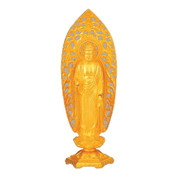- Home
- BY PRICE
- Premium Grade
- Amitabha Tathagata (Amida-nyorai) with miniature shrine and in a box
BUDDHA STATUE
TAKAOKA COPPER
Amitabha Tathagata (Amida-nyorai) with miniature shrine and in a box
- PRICE:
- $310.00
- SKU:
- V4-MVSR-CGCW
- Availability:
- We will ship within 3-5 days after receiving cleared payment.
- Shipping:
- Calculated at checkout
| Shipping: | Standard Int'l Shipping(2-7 days) Item location: Chuo-ku, Tokyo, Japan |
|---|---|
| Delivery: |
Seller ships within 3-5 days after receiving cleared payment. |
| Payments: |

|
| Returns: | Please refer the return policy in detail. |
Product Description
** This item is made hand so it may have a little difference in color and drape. It may take time (a few weeks) from your order to shipping. Your understanding is greatly appreciated.**
--------------------------------------------PLEASE NOTE:
- This is a brand new arts and crafts item that was carefully created by a traditional Japanese artist.
- This is not an antique product.
- 100% made and crafted in Japan.
- It is not a one of a kind only production.
Takaoka Copperware
400 years of skill and sole, it breathes life into copper
Located on the Japan Sea side, Takaoka, Toyama Prefecture.The origin of Takaoka Copperware dates back to about 400 years ago.
Takaoka Copperware was evolved and developed under the generous patronage of the Kaga Clan. The casting of Buddhist alter fittings become very popular by the mid-Edo period (1603 to 1868) and were exhibited in the world expositions from Meiji (1868 to 1912) to early Showa period.
In 1975, Takaoka Copperware has received the first traditional crafts producer of Japan as a major producer of copper casting and its tradition, skills and history have been passed down until today.
[Working Process]
1. Prototype Production
The prototype artist creates a prototype with clay. Then, it was transferred to plaster for casting to create a plaster prototype.
2. Casting
After dissolving copper in a crucible, it is poured into a mold. Once becoming a solidified alloy, the mold is disjointed.
3. Finishing and polishing
Using a copper file and a graver, an artist carefully shapes and finishes by hand to reproduce the original.
4. Coloring
Coloring serves as a corrosion prevention and makeup. There are some traditional colorings and techniques such as "Ohaguro (tooth blacking)", "Ibushi (smoke)" and "Sei-do-iro (bronze)"
5. Finishing
Depending on the design, chasing and/or inlaid on the surface may be applied.
Product Specifications
Materials: Alloy (die-cast) gold plating
Size: Height9.5 cm (H3.74 inc) *included mini shrine
*Buddha's Height only: about H7 (2.76 inc)
Weight: about 1.5 kg (3.31 lbs)
Box: Comes in a heavy paper box
--------------------------------------------PLEASE NOTE:
- This is a brand new arts and crafts item that was carefully created by a traditional Japanese artist.
- This is not an antique product.
- 100% made and crafted in Japan.
- It is not a one of a kind only production.
Takaoka Copperware
400 years of skill and sole, it breathes life into copper
Located on the Japan Sea side, Takaoka, Toyama Prefecture.The origin of Takaoka Copperware dates back to about 400 years ago.
Takaoka Copperware was evolved and developed under the generous patronage of the Kaga Clan. The casting of Buddhist alter fittings become very popular by the mid-Edo period (1603 to 1868) and were exhibited in the world expositions from Meiji (1868 to 1912) to early Showa period.
In 1975, Takaoka Copperware has received the first traditional crafts producer of Japan as a major producer of copper casting and its tradition, skills and history have been passed down until today.
[Working Process]
1. Prototype Production
The prototype artist creates a prototype with clay. Then, it was transferred to plaster for casting to create a plaster prototype.
2. Casting
After dissolving copper in a crucible, it is poured into a mold. Once becoming a solidified alloy, the mold is disjointed.
3. Finishing and polishing
Using a copper file and a graver, an artist carefully shapes and finishes by hand to reproduce the original.
4. Coloring
Coloring serves as a corrosion prevention and makeup. There are some traditional colorings and techniques such as "Ohaguro (tooth blacking)", "Ibushi (smoke)" and "Sei-do-iro (bronze)"
5. Finishing
Depending on the design, chasing and/or inlaid on the surface may be applied.
Product Specifications
Materials: Alloy (die-cast) gold plating
Size: Height9.5 cm (H3.74 inc) *included mini shrine
*Buddha's Height only: about H7 (2.76 inc)
Weight: about 1.5 kg (3.31 lbs)
Box: Comes in a heavy paper box

